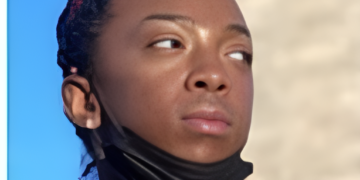On Sept. 28, the City of Oxford announced masks would no longer be required in public indoor spaces, leading some members of the University of Mississippi community to question whether the campus mask mandate would remain in place.
The university announced its temporary mask mandate on Aug. 5, stating that “the university will require face coverings in indoor public spaces on campus, regardless of vaccination status.”
The University of Mississippi Public Relations Department wrote Monday in an email, “(Wearing masks) is an evidence-based mitigation strategy that has assisted us in delivering in-person learning and maintaining a full on-campus experience with the least amount of disruption.”
Dr. Jean Gispen, a staff physician at the University of Mississippi Employee Health Center, serves on the Public Education and Awareness subcommittee of the Future Planning Task Force and said the mask mandate remains in place because of the University’s close following of Centers for Disease Control and Mississippi State Department of Health guidance.
Gispen said that because Lafayette County’s vaccination rate is so low, “The case positivity rate in our county is 5.08%, which means that 5% of all tests run in the county for COVID-19 are positive. We are considered an area of high transmission of the virus.” The CDC recommends that vaccinated and unvaccinated people wear masks in indoor public spaces to prevent infection or transmission of the delta variant.
“The faculty and staff are extraordinarily grateful that the mask mandate is in place,” Gispen said “It keeps us safer.”
There have been efforts from the student body and Oxford locals to end the mask mandate. One petition, organized by criminal justice major Hayden Gibbons, calls the university’s mask mandate “illogical.”
“We want to stop the muzzling of students and the suppression of human rights,” wrote Gibbons. “The University of Mississippi has imposed illogical restrictions on students that force them to wear masks indoors. Our goal is for the change of mandates to allow freedom of choice for one’s own individual health.”
Damien Harbin, a senior criminal justice student at the University of Mississippi, is a supporter of unmasking Ole Miss.
“It makes no sense,” Harbin said. “We have to wear masks inside, but as soon as we take two steps outside we can hop into a hot and sweaty ball pit with a stranger or pack thousands into the Grove to eat and drink after each other. These aren’t things you do if you’re even the slightest bit worried about spreading disease.”
Harbin said he believes the university is more concerned about their image and not actually preventing the spread of COVID-19.
“The university has no standard for masks. By the Chancellor’s Office’s own admission, they don’t care about thread count (or) material (of the mask)… so long as it’s worn correctly. You can literally wear a lace mask and be in compliance,” Harbin said. “It’s because of this and more that I firmly believe the university doesn’t care about COVID-19. They just want people to think they do. It’s all theater and we’re all forced actors.”
The Future Planning Task Force was developed prior to the fall 2020 school year and is led by Provost Noel Wilkin. The task force consists of roughly 50 administrators and has five established subcommittees “with wide representation from across the campus to develop an operational framework.”
Wilkin did not respond to requests for an interview.
Robert Cummings, the executive director of academic innovation who serves on the Academic Planning and Experiences subcommittee of the Future Planning Task Force, said the face covering policy is absolutely crucial for successful indoor teaching during the pandemic.
“The wearing of masks in indoor spaces has allowed the university to remain open and to fulfill its teaching and learning mission during the surge of the COVID-19 Delta variant,” Cummings said.
Cummings helps lead the Keep Teaching and Learning Group on campus, a group that discusses classroom issues and difficulties. The Keep Teaching and Learning Group created a faculty learning community to assist students and faculty during the pandemic. Cummings said there has not been any discussion in the group’s biweekly meetings about any student or faculty opposition to mask mandates.
“It is not a perfect system, nor is it completely representative of the concerns of everyone on campus, but this is not a topic which I have heard addressed there,” Cummings said.
During the time the mask mandate was announced, Mississippi was in the midst of its fourth COVID-19 wave, with 90% of the new COVID-19 cases being attributed to the delta variant, according to State Health Officer Dr. Thomas Dobbs. On Aug. 5, the same day the mask mandate was reinstated, the Associated Press reported that Mississippi’s major hospitals were overwhelmed with very little available Intensive Care Unit beds.
“You can’t fill a classroom with non-immune kids without a mask on with the most contagious coronavirus we’ve ever seen circulating and expect for it not to spread — it’s just biology,” Dobbs said to the Associated Press. “Our will and desire to abandon safety measures does not trump the reality of the biology of the delta virus.”

























